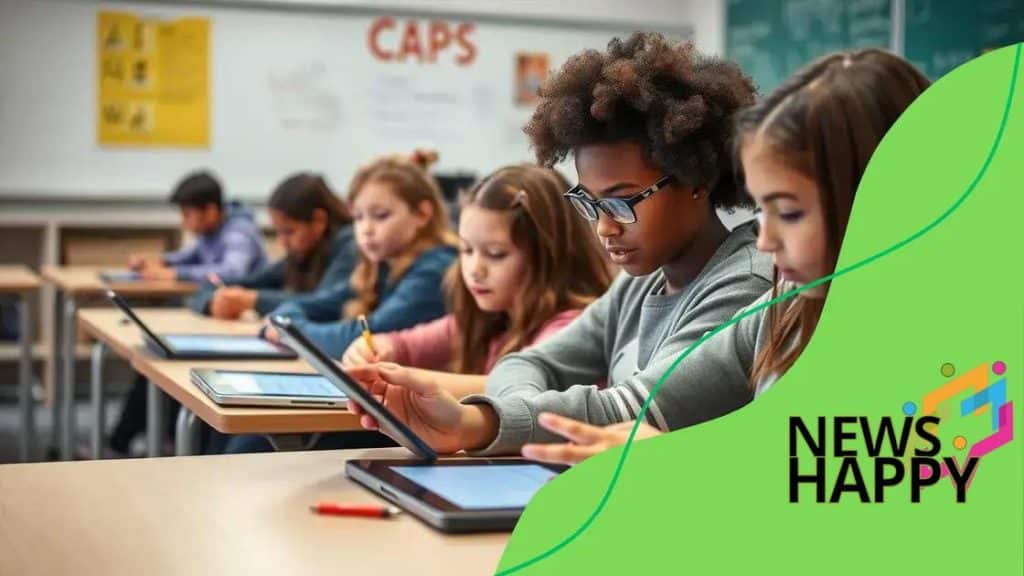Innovations in educational assessments with machine learning

Anúncios
Innovations in educational assessments with machine learning enhance personalized learning, provide real-time feedback, and enable data-driven insights, addressing diverse student needs effectively and improving overall educational outcomes.
Experts say that innovations in educational assessments with machine learning can significantly enhance the evaluation process. But how does this technology reshape traditional methods? Let’s delve into some exciting developments.
Anúncios
Understanding machine learning in education
Understanding machine learning in education is vital as technology continues to evolve. This innovative approach offers personalized learning experiences for students, adapting to their individual needs and strengths.
What is Machine Learning?
Machine learning is a branch of artificial intelligence that enables computers to learn from data and improve their performance over time. In education, it plays a crucial role by analyzing vast amounts of data to identify patterns and insights.
Benefits of Machine Learning in Education
Implementing machine learning in the classroom can lead to various advantages:
Anúncios
- Customized learning pathways for each student.
- Timely feedback on student performance.
- Identification of learning gaps to target interventions.
- Enhanced engagement through adaptive learning technologies.
By utilizing machine learning, educators can provide support tailored to each learner’s distinct requirements. When teachers harness these tools effectively, they empower students to reach their learning potential.
Real-World Applications
Institutions are already using machine learning to transform educational practices:
- Analyzing student data to improve retention rates.
- Developing intelligent tutoring systems.
- Implementing predictive analytics for enrollment management.
This technology not only helps streamline administrative tasks but also enriches the overall educational experience for students, making learning more accessible and engaging.
Incorporating machine learning in education creates new opportunities for learners and educators alike. As we explore further, it becomes clear that the classroom of the future is becoming increasingly data-driven and personalized.
Key benefits of machine learning assessments
The key benefits of machine learning assessments in education are reshaping how we evaluate student abilities. This technology enables personalized evaluations and offers insights that traditional methods cannot. By analyzing data, machine learning identifies trends and patterns that enhance the learning process.
Enhanced Personalization
One of the most significant advantages of machine learning assessments is the ability to tailor evaluations to individual student needs. This personalized approach allows educators to:
- Adapt questions based on a student’s progress.
- Provide targeted support where needed.
- Offer resources that fit each student’s learning style.
This means that assessments are not one-size-fits-all; instead, they evolve with the learner, ensuring a better understanding of their strengths and weaknesses.
Data-Driven Insights
Another benefit is how machine learning can process vast amounts of data quickly. This capability offers valuable insights regarding:
- Overall class performance trends.
- Specific areas where students struggle.
- Longitudinal analysis of student growth over time.
With these insights, teachers can make informed decisions to improve instruction and adapt their teaching methods.
Moreover, machine learning assessments can provide real-time feedback. Unlike traditional tests that require significant time for grading, these assessments allow students to see their results immediately. This immediacy helps them understand their mistakes and improve more effectively.
Case studies of innovative applications

Case studies of innovative applications of machine learning in education highlight how institutions are successfully enhancing learning experiences. Schools and universities are leveraging this technology to meet the diverse needs of students.
Personalized Learning Solutions
One effective application is through personalized learning platforms. For instance, a well-known online learning company uses machine learning algorithms to analyze student interactions on their platform. Based on this data, the system recommends tailored resources that best fit each learner’s progress. This customization keeps students engaged and motivated, leading to improved academic outcomes.
Predictive Analytics for Student Success
Some universities are applying machine learning for predictive analytics to identify at-risk students. By examining factors such as attendance, grades, and engagement, these institutions can intervene early. Case studies show that this proactive approach not only helps students stay on track but also enhances overall retention rates.
Another noteworthy example involves a school district that implemented machine learning assessments to evaluate student understanding in real time. Teachers received immediate feedback, allowing them to adjust their instruction on the fly. Such quick adjustments significantly impacted student performance and satisfaction.
AI-Enhanced Tutoring Systems
AI-driven tutoring systems are another innovative application of machine learning. A recent project involved an AI tutor that adapts to individual student learning styles. For example, it recognizes when a student struggles with a concept and provides additional practice problems or alternative explanations. This adaptability helps students grasp difficult subjects more effectively.
These case studies illustrate the transformative impact of machine learning in education. By exploring these innovative applications, we see how technology can create more equitable and efficient learning environments.
Challenges in implementing machine learning
Implementing machine learning in educational settings comes with several challenges that institutions must address. These obstacles can hinder the effective use of this technology and its potential benefits. Understanding these challenges is key to a successful transition.
Data Privacy Concerns
One of the primary challenges revolves around data privacy. When using machine learning, schools collect and analyze large amounts of student data. This raises questions about how this data is stored, who has access to it, and how it is used. Ensuring compliance with regulations like FERPA (Family Educational Rights and Privacy Act) is critical.
Technology Integration
Another significant challenge is integrating machine learning tools into existing systems. Many schools may have outdated technology and infrastructure that cannot support advanced machine learning applications. This integration requires not only investment in new technologies but also comprehensive training for educators and administrators.
Moreover, the lack of sufficient technical knowledge among staff can impede the implementation process. Educational institutions need to provide thorough training programs that give teachers and staff the skills to effectively use machine learning tools. Otherwise, they may struggle to utilize these powerful resources to their full potential.
Bias and Fairness
Bias in machine learning algorithms is another concern that needs attention. If the data used to train these algorithms is biased, the results may also reflect those biases. This can lead to unfair assessments of student performance and learning capabilities. Ensuring that algorithms are trained on diverse, representative datasets is essential to mitigate this risk.
Addressing these challenges requires careful planning and collaboration among educators, technologists, and policymakers. It is crucial to create a supportive environment that fosters the effective use of machine learning while prioritizing ethical concerns and equity in education.
Future trends in education technology
The future trends in education technology focus on enhancing learning experiences and making education more accessible. As machine learning continues to evolve, it shapes the way students learn and how instructors teach.
Increased Personalization
One significant trend is the move towards more personalized learning experiences. Machine learning allows educational software to adapt to each student’s unique needs. By analyzing data on student performance, these tools can provide tailored resources and feedback, which enhances learning outcomes.
Integration of Artificial Intelligence
Another trend is the integration of artificial intelligence into classroom settings. AI-powered tools can automate administrative tasks, giving teachers more time to focus on instruction. For example, smart grading systems can evaluate assignments quickly, while AI-driven platforms offer chatbots for student support. This can lead to a more efficient learning environment.
Virtual Reality (VR) and Augmented Reality (AR) are also gaining traction. These immersive technologies enable students to engage with content in ways that traditional methods cannot. For instance, using VR, students can take virtual field trips or simulate complex scenarios that enhance their understanding.
Collaborative Learning Environments
The rise of online and hybrid learning formats promotes collaborative learning environments. Tools that foster teamwork will become more common, allowing students to work together on projects even from different locations. This not only enhances communication skills but also prepares students for a globalized workforce.
Emphasizing social-emotional learning is another key trend. Technology will increasingly be designed to support skills like empathy and self-awareness. Online platforms can provide resources for mindfulness and well-being, supporting students’ mental health alongside academic performance.
As these trends unfold, it will be vital for educators to stay informed and adapt. The continuous evolution of education technology promises to transform learning experiences, making education more engaging and effective for all.
In conclusion, the innovations in educational assessments with machine learning hold great promise for the future of learning. Personalized approaches, data-driven insights, and cutting-edge technologies can create more engaging and effective educational experiences. However, it is essential to address challenges such as data privacy, technology integration, and bias to fully realize these benefits. As we continue to embrace these changes, educators and students alike will thrive in a more adapted, inclusive, and supportive learning environment.
FAQ – Frequently Asked Questions about Innovations in Educational Assessments with Machine Learning
What are the main benefits of using machine learning in education?
Machine learning offers personalized learning experiences, timely feedback, and data-driven insights to enhance student engagement and success.
How does machine learning improve assessments?
It analyzes student data to provide tailored resources and feedback, effectively identifying strengths and areas needing improvement.
What challenges do schools face when implementing machine learning?
Schools grapple with data privacy concerns, technology integration issues, and potential biases in algorithms that affect assessments.
What are some future trends in education technology?
Future trends include increased personalization, AI integration, virtual reality experiences, and a focus on collaborative and social-emotional learning environments.





